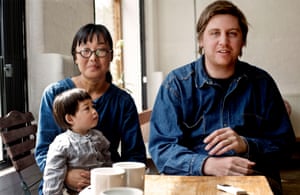“Cafe Oto has become a crown jewel,” says former Sonic Youth singer and guitarist Thurston Moore. “It’s by far the most critical listening room in London. It’s a clubhouse for many of us.”
Oto is a 150-capacity venue in Dalston, east London: a single room that audiences and musicians enter into directly from the street. It has low ceilings, creaky old furniture, no green room for the musicians to hide in and no stage. Yet it has become one of the best known and loved spaces for experimental music in the world, attracting regular performers such as Moore and the Sun Ra Arkestra, as well as the occasional superstar such as Anthony Braxton and Yoko Ono.
This month Oto celebrates its 10th anniversary, and the Guardian is marking it with a pair of podcast episodes that explore its story and its music. The birthday is a remarkable achievement for a venue dedicated to music on the margins and located in one of the most aggressively gentrified areas of the capital. As bougie tower blocks are erected all around, one suspects that many of the new tenants quite like the fact that they live beside such a hub of creativity, so long as they don’t have to listen to the awkward and acerbic sounds produced there most nights. Up the road, the Dance Tunnel nightclub closed after Hackney council upheld “the rights of our residents to a good night’s sleep”. So far, the screeching saxophones haven’t yet got Oto kicked out of the area.
One of the most remarkable elements of Cafe Oto is the sheer breadth of those awkward, acerbic sounds. Although it remains best known for free improvisation and free jazz (still making up around half of events), its programme has continued to expand, embracing folk singers, modern composition, noise rock and electronica and, more recently, Tuareg dance bands and DJs as well as marginal dance scenes such as algorave and footwork. It’s eclectic yet somehow coherent. Co-founder Hamish Dunbar explains: “Essentially there’s an underlying idea behind all the music. Maybe it’s political, or it’s social, or it has a purpose, bigger and more powerful.”

Part of that bigger and more powerful purpose relates directly to the community that has grown around Oto. There is a core of full-time employees who run the bar and the venue, but the venue still relies on a team of volunteers to keep it afloat. “People find it very hard to leave. I’ve been here nine years,” says Midori Ogata, the daytime cafe manager. By embracing the volunteers, and involving them in the development of Oto, Dunbar and Keiko Yamamoto, his wife, have ensured its viability.
The music performed at Cafe Oto is not for everyone, and you can’t rock up there on a random night certain you will enjoy it. But such is the quality of the programming and reputation of the venue that you will always find a performance and audience that is engaged and sincere. “The place is charmed, the vibe in the room gives it a wonderful effervescence,” says Moore. As not everyone can enjoy that vibe in person, the venue is keen to reach out to as many people as possible through its constantly expanding digital archive: “I dream of a space online where you can come to Oto and play around in this free listening space,” says Abby Thomas, its archivist.
In the last few years, rents in Dalston have increased rapidly, forcing scores of artists and small businesses out of the area. But in 2008 Dunbar and Yamamoto had the foresight to take out a 25-year lease on a property that had been empty for two years. Their nearby project-space building, where musicians can rehearse for free and small-scale events are held, is currently subject to a lease negotiation with council, but Dunbar and Yamamoto are hopeful of securing an extension. There is of course no guarantee that Oto will last those 25 years, such is the flux of London. But the blueprint is set for a dedicated, community-minded 21st-century space for musical experimentation that is truly independent and successful on its own terms.